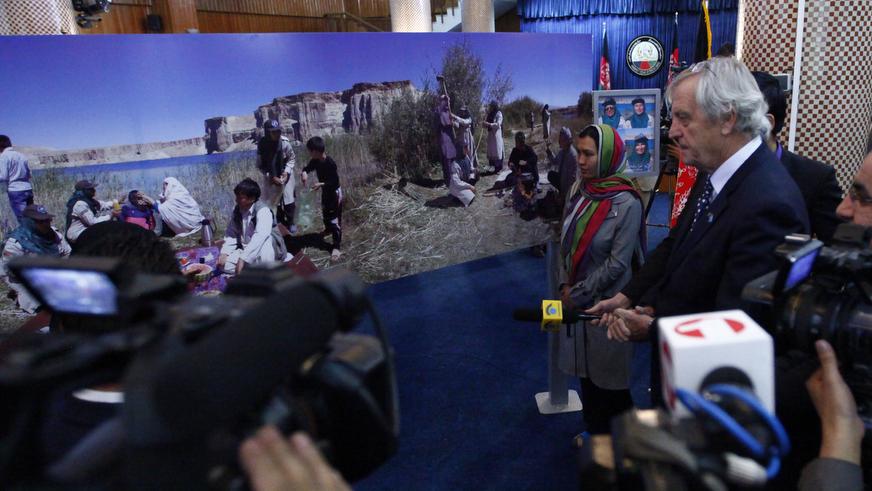KABUL - The extraordinary work of a group of Afghan professionals who have made a positive difference in their fields, for the betterment of Afghanistan, was celebrated at a photographic exhibition in Kabul today.
An estimated 150 people, from Afghanistan’s media outlets and civil society groups, along with UN representatives, attended the exhibition, which featured a collection of specially commissioned panoramic photographs measuring 4 metres wide.
Each photo (which can be viewed onUNAfghanistan.org) contains three main scenes, highlighting key aspects of the professionals’ work in areas such as improved health care, de-mining, support for returning refugees and environmental protection.
Nicholas Haysom, the UN Secretary-General’s Special Representative for Afghanistan and head of UNAMA, said Afghanistan has been an “active, full and vibrant member of the United Nations almost since the beginning of the United Nations.”
The envoy said the UN’s 70th anniversary in Afghanistan is marked by celebrating “the work of ordinary Afghans, although they are also extraordinary Afghans.”
He said the Afghan professionals featured in the exhibit represent activities that stretch across the full diversity of UN engagement in Afghanistan: “Their work best expresses our ideals. Their work is a credit to them and to Afghanistan.”
More importantly, he went on to say, their work recognizes that the UN can do nothing except through its capacity to work with and through Afghans. Mr. Haysom said the UN intends to stay in Afghanistan for as long as it will take for Afghans to accomplish their aspirations – a stable and prosperous Afghanistan.
Two of the professionals included in the exhibition addressed the audience: Maternal and Child Health Advocate Feroza Mushtari and National De-mining Director Mohammad Sediq Rashid.
Ms. Mushtari is one of Afghanistan’s leading maternal health advocates. She studied at Afghanistan’s first formal midwifery programme, graduating at a time when the country was one of the most dangerous places to be an expectant mother and few women had access to specialized midwife services.
Before Feroza started work in 2004, there were around 1,600 deaths of women for every 100,000 births in Afghanistan. Today, this number has been reduced to 327 deaths. Child mortality rates have been similarly reduced.
“My biggest wish is to make every pregnancy and every birth safe,” says Ms. Mushtari. “I am committed to it.”
Feroza has worked with several national and international organizations, including training midwives in a United Nations Population Fund (UNFPA) obstetrics project between 2006 and 2012, and a United Nations Children’s Fund (UNICEF) training project for midwives in 2014. She is currently the Acting President of the Afghan Midwives Association.
“UN agencies have a played a vital role in my capacity-building,” says Ms. Mushtari.
Mohammad Sediq Rashid is Director of the Mine Action Coordination Centre of Afghanistan (MACCA). He has spent more than 25 years in different posts with UN-related organizations helping to rid the country of mines and other explosive remnants of war, protecting communities and opening land for productive use.
Previously known as UN-MACA, MACCA is supported by the United Nations Mine Action Service (UNMAS) and the UN Office for Project Services (UNOPS).
“One of the worst phenomena of the war is the existence of large numbers of landmines and explosive remnants of war [that] exist in residential areas, agricultural areas, schools and roads, making life difficult for the Afghan people,” he says.
Sediq and his dedicated colleagues have performed a vital role in reducing mine-associated casualty rates in almost all regions of the country. Since he began de-mining work in 1989 with the Mine Clearance Planning Agency – an NGO that was primarily funded by the UN Office for the Coordination of Humanitarian Affairs (OCHA) – around 80 per cent of mine-contaminated areas have been cleared.
“I hope and wish that one day this problem will come to an end,” he says. “There should be no more new contamination created in this country, and the minefields and other hazards left behind from previous and current conflicts should be cleared.”
The exhibition photos and information about all the Afghan professionals featured in the exhibit are available on UNAfghanistan.org.
View a transcript of comments made by Nicholas Haysom, the UN Secretary-General’s Special Representative for Afghanistan.






